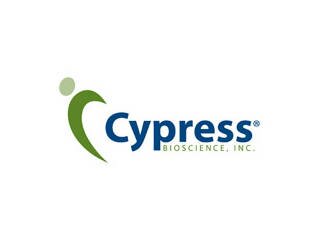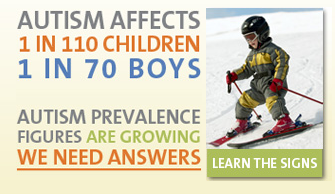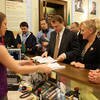Bothell's Marina Biotech has sold the patent rights and technology it holds for the intranasal formulation of synthetic oxytocin analogue Carbetocin to Cypress Bioscience, reports the Puget Sound Business Journal.
Marina Biotech is now focusing on RNA interference technology, to control disease-causing protein expression; Carbetocin is arguably a better fit for Cypress, who work on the development of drugs that affect the central nervous system, and have a good record of bringing them to market speedily.
 Cypress is making an upfront payment of $750,000, with up to $27 million more tied to stages of successful drug development, with "single-digit royalties [going] to Marina Biotech based on commercial sales, if any," summarizes the news release.
Cypress is making an upfront payment of $750,000, with up to $27 million more tied to stages of successful drug development, with "single-digit royalties [going] to Marina Biotech based on commercial sales, if any," summarizes the news release.
What makes Carbetocin worth all this is a) Marina Biotech's intranasal delivery system, which has completed Phase I study, and b) the longer serum half-life of Carbetocin compared to oxytocin (it persists in the blood stream longer). There is also a c) which is potential upside to an oxytocin-based therapy for autism.
While the miracle-cure effects of oxytocin were trumpeted in the press earlier this year (ScienceDaily, Newsweek), like the early notion of the "serotonin deficit" accounting for depression, a simple "oxytocin deficit" hypothesis hasn't been borne out by studies [Modahl, et al, pdf]. (As a spectrum disorder, autism wouldn't necessarily be expected to have a single cause.) Recent studies have shown and not shown a link between the oxytocin receptor gene and autism.
Still, evidence is mounting that oxytocin has therapeutic effects: reducing social anxiety, promoting attention to faces, encouraging imitative behavior, inhibiting repetitive behaviors, helping strengthen emotional memory. Given that in one study, the researchers had to account for the effects of clonidine, Depakote, Tegretol, Dilantin, Ritalin, lithium, and Haldol on their study subjects' oxytocin levels, a therapeutic drug that's an analogue for a naturally occurring hormone is a bright moment in autism treatment, all by itself....
Here we are in the thick of August's silly season, which last year was focused on talk of death panels and this year is dominated by the threat posed by a ZOMG Ground Zero terror mosque. It's almost as if the media has nothing else to do with their time, besides quash intellectual debate and foment fear. Might we suggest they take a break from the crushing twenty-four-hour news cycle, in favor of a movie or two? With that in mind, here's a look at recent DVD releases, care of our good friends at Scarecrow Video.
The silly season of August also means fewer new DVDs of note, but there have been a few out recently that are worth your while: last week brought Date Night and this week marked the release of The Good, the Bad, and the Weird, a Korean take on the spaghetti western. There's also Cemetery Junction, which I honestly don't know much about, but when the words "written and directed by Ricky Gervais and Stephen Merchant" are used, I say, "yes please."...
There hasn't been much by way of new DVDs lately. I mean, there was the Earth Day release of Avatar, which has already made eleventy bajillion dollars no duh no doy, but besides that: Crazy Heart and The Young Victoria, both of which are good enough for the genres they represent; The Lovely Bones, which was terrible; and The Horse Boy, the Mongolia autism rehab film that recently played SIFF Cinema.
Then there is Summer Hours, which is enjoyable as both a nuanced family drama and a mediation on the future of France. Catch it before the assuredly terrible American remake. Don't forget Mystery Team, which is undeservedly underseen cute little comedy about solving crimes when you should be growing up and going to college. And Uncertainty, because I will gladly see any indie film with Joseph Gordon-Levitt. But besides that? Pirate Radio and The Slammin' Salmon? Meh. Consider that done. With the past few weeks out of the way, let's take a look at this week's new releases, care of our good friends at Scarecrow Video....
"Tourist," a view from the Columbia Tower, courtesy of The SunBreak Flickr pool's slightlynorth.
It was a week featuring two of Seattle's most prominent architectural icons: on the tenth anniversary of the Kingdome implosion, the market for commercial space downtown has imploded, too. Beacon Capital Partners missed a loan payment on the Columbia Tower, and faces a 33 percent vacancy rate once Amazon decamps next year. Starbucks announced ten-cent-per-share dividends at its annual meeting. One of our hippos died.
Plans for a private Chihuly exhibit at Seattle Center ran smack into Seattle process; now the Center will open up public bidding for use of the space vacated by the Fun Forest. Seattlepi.com reports that "Beth Campbell filed a motion in U.S. District Court asking that construction of the southern mile of a viaduct-replacement project be delayed until a full environmental-impact study is done of the entire viaduct project."
The city council joined every other Washington Democrat in wishing AG Rob McKenna would not challenge the constitutionality of the federal health care reform bill. Seattle's direct care providers Qliance are looking forward to the new insurance exchanges. Seattle was named the top city for cybercrime in America.
Mayor McGinn claims he has an affordable West Seattle-Ballard light rail line up his sleeve. Amtrak passengers had to take the long way around when a mudslide hit the tracks near Mukilteo--for the second time in two weeks. Mudslides aside, we now have extra Amtrak to Vancouver, B.C., through September. Nick Licata wants to lean on the U.S. Army Corps of Engineers for help with the seawall replacement....
 From the Autism Speaks website
From the Autism Speaks website
Sallie Tisdale has an article in Harper's (subscribers only) this month about her autistic daughter. There's an element of forestalled explanation to it; yes, she said "daughter."
My daughter, Annie, still lives with us. She is twenty-six now and at the moment is sitting on the porch, looking out at the street. Soon she will come in and pace for a while, her head down. Later she will read the first few pages of a book—the same book, the same pages, that she read last week and the week before, and will read again tomorrow.
"Autistic son" delivers 175,000 results on Google. "Autistic daughter," just 31,000. People are not sure why more boys than girls are found to have autism. Epidemiologically, the ratio is supposed to be about 3.6 boys to one girl.
It's known that girls can learn to mask some of the effects of autism more easily than boys, so it's possible that they are under-diagnosed in general. Studies show that hallmarks like "language deficits, tantrums, and aggression are all less common in girls than boys in the general population." A British researcher raises the specter of a shadow population of "shy" girls who like to keep lists and count calories (even to anorexia).
Tisdale's story is a primer on autism's variability, and its effects on everyone who struggles with it, including caregivers. Tisdale recounts the lifelong challenge of it: the official optimism with which her daughter was handed off as she finished school, the time her daughter started hallucinating and had to be given antipsychotic medication. Writes Tisdale:
Long-term studies of people with autism are not reassuring. Autistic adults generally read poorly, have few math skills. Very few go to college, are employed, or lead independent lives. The majority say they have no friends....
(more)
Autism is a major research driver in the Northwest--in Seattle we have both the UW's Autism Center and Seattle Children's Autism Center (along with an autism walk and the Lakeside Center for Autism). Seattle Children's Autism Center is a recent creation, resulting from Children's friendly takeover of ASTAR, and offers both clinical study and treatment, making it a one-stop autism shop for families.
Tonight at 8 p.m., KING 5 is airing a Children's Healthlink Special, "The World Within: Northwest Stories of Autism" (also on KONG at 7 p.m. on January 3). Local icon Jean Enersen will be exploring the startling spike in autism rates--it's estimated that one in a hundred children have autism spectrum disorder (ASD)--and why researchers still don't know precisely what is responsible for either ASD or its increase.
What we do know is that when the CDC compared rates of diagnosis in eight-year-olds in 2006 and compared that to 2002, autism's prevalence had increased 57 percent. We also know that early intervention treatment has good results, but that the "early" part is absolutely key. Parents tend to notice something unusual about their children at age two, but in most cases official diagnosis and treatment don't occur until the child is over four years old.
In the House health care bill, $17 would be set aside during the first year for a "National Training Initiative on Autism Spectrum Disorders." This is after NIMH allocated $60 million in "stimulus" funding to promote research on better, earlier means of diagnosis and/or effective treatment for older children and adults with ASD. So autism is literally in all the headlines, though for the short term it seems we're more focused on learning how to live with it than on solid leads for cure or prevention.
Michael Specter's book Denialism (de rigueur subtitle-of-absurd-length: How irrational thinking hinders scientific progress, harms the planet, and threatens our lives) might look like it'd fit nicely on the bookshelf with Why People Believe Weird Things and Unscientific America, but it would likely jump the other two and scuff up their dust jackets. Specter has been writing for the New Yorker since 1998, and some of the Big Apple's pugnacity seems to have rubbed off on him. Or maybe he was always that way.
It's a curious book because while you might expect Holocaust (or other genocide) deniers, 9/11 conspiracy theorists, creationists, global warming skeptics, or other troublesome bands of misinformers to pop up, they don't. "I decided to focus on issues like food, vaccinations, and our politically correct approach to medicine," writes Specter in the introduction, "because in each of these arenas irrational thought and frank denialism have taken firm root."
Yet as Grist argues in a critique of the book, if a small group of global warming deniers delays action long enough that we reach a point of no return for the planet, that's a big deal. If a small group of people insist on paying more for Whole Foods organic produce because it makes them feel healthier, that's...part of their shopping budget. Yet, Grist notes, "The book’s index has no entry for 'climate change.' The entry for 'Global warming' cites just one page—a reference to genetically modified foods as a “solution” to global warming."
I can't speak for Specter, but his approach feels Freakonomics-y or Gladwellian: one of those "forget everything you thought you knew" come-ons, juiced up with the blood of a few hodgepodge sacred cows. In his introduction, Specter's language is fairly circumspect and even-keeled. But the chapters on the "irrational" response to Vioxx, hysteria around vaccines, the rise of the organic food fetish and natural supplement worship, and the role of genetics in medical treatment, contain what some call "provocative" and others might call "unsubstantiated" claims.
Even when I agreed with him, Specter managed to rub me the wrong way. Though he struggles to sound filled with empathy for the irrationalists, Specter comes off as an old-school anthropologist tolerant of a tribe's quaint superstitions. Of course it's natural for you to believe that god threw the lightning at you, he seems to say. (I kept wondering who he was writing for--I'll get the chance to ask him when he's town.)
Again and again, Specter presents what sounds like both sides of an argument, except that one's irrational, anti-science, and threatening all our lives. Specter takes the lesson of the Vioxx scandal to be primarily one of emotional overreaction. We don't understand pharmacological medicine, so we trust and fear it in equally overreaching amounts. If we rationally accepted its risks, Vioxx might be on the market today.
What he doesn't spend a lot of time considering is whether the overreaction is called for given the scope of our reliance on this medicine. That is, we can't really afford to have pharmaceutical companies lying to us about known problems with medicine prescribed to millions--it would set a troubling precedent.
There's an argument to make for Vioxx, and Specter makes it persuasively. But he also tells a story of practiced deceit, political pressure, and retributive firing and ends his chapter saying: "Most people don't walk out the door trying to hurt other people." No, they don't. But most people don't run pharmaceutical companies. That pool is tiny. And a few bad apples could potentially poison the apple cart. So we hold them to higher standards....




Most Recent Comments